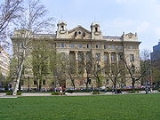
Hungarian National Bank
Encyclopedia
The Hungarian National Bank is the central bank
of Hungary. The principal aim of the bank is to retain price stability. It is also responsible for issuing the national currency, the forint
, controlling the cash circulation, setting the Central Bank base rate, publishing official exchange rates and managing the national reserves of foreign currency and gold to influence exchange rate
s. It controls the country’s monetary policy
.
The MNB maintains a medium-term inflation target
of around 3%. This is somewhat higher than the generally accepted level of inflation for price stability in Europe, and it is used in order to allow for Hungary's "price catch-up" to the rest of Europe.
The president of the Hungarian National Bank is appointed by the President of the Republic at the proposal of the prime minister for a term of 6 years. The most important decision-making body of the Hungarian National Bank is the Monetary Council. The building of the Hungarian National Bank is located on Hold Street, in the Inner City of Budapest
. It can be found next to the building of the US embassy.
According to Hungary's Central Bank Act, which founded the Hungarian National Bank, "The primary objective of the MNB shall be to achieve and maintain price stability. Without prejudice to its primary objective, the MNB shall support the economic policy of the Government using the monetary policy instruments at its disposal."
Hungary formerly was to join the Euro in 2010, thus divesting the MNB of most of its powers. However, central bank leaders have criticized this plan, saying that the fiscal austerity requirements would slow Hungary's growth.
MNB Currency Emissions Division (Head office)
1850 Budapest, V. Hold u. 7.
Central bank
A central bank, reserve bank, or monetary authority is a public institution that usually issues the currency, regulates the money supply, and controls the interest rates in a country. Central banks often also oversee the commercial banking system of their respective countries...
of Hungary. The principal aim of the bank is to retain price stability. It is also responsible for issuing the national currency, the forint
Hungarian forint
The forint is the currency of Hungary. It is divided into 100 fillér, although fillér coins are no longer in circulation. The introduction of the forint on 1 August 1946 was a crucial step of the post-WWII stabilization of the Hungarian economy, and the currency remained relatively stable until...
, controlling the cash circulation, setting the Central Bank base rate, publishing official exchange rates and managing the national reserves of foreign currency and gold to influence exchange rate
Exchange rate
In finance, an exchange rate between two currencies is the rate at which one currency will be exchanged for another. It is also regarded as the value of one country’s currency in terms of another currency...
s. It controls the country’s monetary policy
Monetary policy
Monetary policy is the process by which the monetary authority of a country controls the supply of money, often targeting a rate of interest for the purpose of promoting economic growth and stability. The official goals usually include relatively stable prices and low unemployment...
.
The MNB maintains a medium-term inflation target
Inflation targeting
Inflation targeting is an economic policy in which a central bank estimates and makes public a projected, or "target", inflation rate and then attempts to steer actual inflation towards the target through the use of interest rate changes and other monetary tools.Because interest rates and the...
of around 3%. This is somewhat higher than the generally accepted level of inflation for price stability in Europe, and it is used in order to allow for Hungary's "price catch-up" to the rest of Europe.
The president of the Hungarian National Bank is appointed by the President of the Republic at the proposal of the prime minister for a term of 6 years. The most important decision-making body of the Hungarian National Bank is the Monetary Council. The building of the Hungarian National Bank is located on Hold Street, in the Inner City of Budapest
Budapest
Budapest is the capital of Hungary. As the largest city of Hungary, it is the country's principal political, cultural, commercial, industrial, and transportation centre. In 2011, Budapest had 1,733,685 inhabitants, down from its 1989 peak of 2,113,645 due to suburbanization. The Budapest Commuter...
. It can be found next to the building of the US embassy.
According to Hungary's Central Bank Act, which founded the Hungarian National Bank, "The primary objective of the MNB shall be to achieve and maintain price stability. Without prejudice to its primary objective, the MNB shall support the economic policy of the Government using the monetary policy instruments at its disposal."
Hungary formerly was to join the Euro in 2010, thus divesting the MNB of most of its powers. However, central bank leaders have criticized this plan, saying that the fiscal austerity requirements would slow Hungary's growth.
Demonetised and damaged currency
Demonetised or damaged currency issued by the Hungarian National Bank can be exchanged in their head office and two regional offices.MNB Currency Emissions Division (Head office)
1850 Budapest, V. Hold u. 7.

